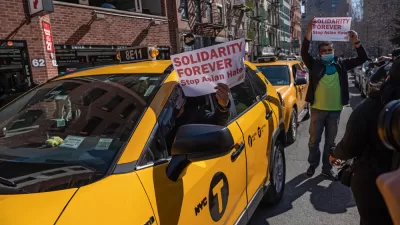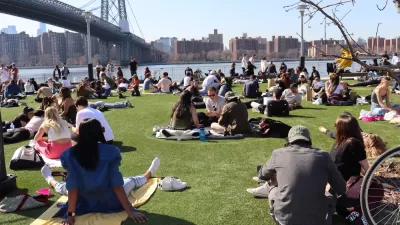An expert panel convened to discuss the effect of the coronavirus on the foundations of society and contemporary life. The future, both the remaining time dealing with the pandemic and after, is becoming more clear with every passing day and week.
The most common request I have received as managing editor of Planetizen since the outset of the coronavirus crisis has been to use the website to field a conversation, and debate, about the future of urban planning and design, focusing on questions about density, transportation, and urban design.
The course preview above offers a taste of Planetizen's first remote panel for the Planetizen Courses platform. The beginning of the "The Future of Cities After COVID-19" discussion is available in the YouTube video above, but the full recording of the panel is available for free, and for AICP CM credit, on the Planetizen Courses website.
The participants, Allison Arieff, William Fulton, Scott Frazier, and Mariela Alfonzo, each bring a unique perspective and eloquence to the discussion. The panel starts out, as shown in the video above, by discussing beginning to develop a framework of understanding for the emerging debate about the future of communities. Speculation and opinions about the future have ranged from predictions about the viability of public transit to the future of the housing market and even to the minutiae of elevators and hallways. Planetizen gathered a collection of articles detailing the earliest episodes on of this this debate at the outset of the crisis in the United States, and on numerous occasions since. Elsewhere on the Internet, Brent Toderian has taken the mantle on one side of the issue, Joel Kotkin the other.
"The Future of Cities After COVID-19" panel dove into specifics about data and policies, but also offered productive insights to help understand the crisis and its potential to generate change. The panel serves as a reminder that humans influence environments, and vice versa, and offers a call to action for planners, urban designers, politicians, and the public to start advocating and working for the future they would like to see emerge from this crisis. For additional references cited in the panel discussion, see below:
- Texas Losing its Housing Affordability Advantage (Planetizen, April 15)
- Could cars emerge with a better image when SF emerges from coronavirus emergency? (San Francisco Chronicle, April 14)
- A Rare Chance for Urban Innovation (Planetizen, April 14)
- Early Indications of Car Industry's Future Emerge (Planetizen, April 14)
- Race, Planning Intersect as the Coronavirus Kills Black and Latino Americans at Higher Rates (Planetizen, April 14)
- Opinion: Transit Has Always Been an Essential Service (Planetizen, April 13)
- Your Covid Stories: Citymakers Share Their Hopes, Fears, and Little Everyday Moments... (State of Place, April 8)
- How Coronavirus Will Change Cities, From Public to Private Lives (Planetizen, April 1)
- Applying the Lessons of COVID-19 to Climate Change (Planetizen, April 1)
FULL STORY: The Future of Cities After COVID-19

Trump Administration Could Effectively End Housing Voucher Program
Federal officials are eyeing major cuts to the Section 8 program that helps millions of low-income households pay rent.

Planetizen Federal Action Tracker
A weekly monitor of how Trump’s orders and actions are impacting planners and planning in America.

Ken Jennings Launches Transit Web Series
The Jeopardy champ wants you to ride public transit.

California Invests Additional $5M in Electric School Buses
The state wants to electrify all of its school bus fleets by 2035.

Austin Launches $2M Homelessness Prevention Fund
A new grant program from the city’s Homeless Strategy Office will fund rental assistance and supportive services.

Alabama School Forestry Initiative Brings Trees to Schoolyards
Trees can improve physical and mental health for students and commnity members.
Urban Design for Planners 1: Software Tools
This six-course series explores essential urban design concepts using open source software and equips planners with the tools they need to participate fully in the urban design process.
Planning for Universal Design
Learn the tools for implementing Universal Design in planning regulations.
Ada County Highway District
Clanton & Associates, Inc.
Jessamine County Fiscal Court
Institute for Housing and Urban Development Studies (IHS)
City of Grandview
Harvard GSD Executive Education
Toledo-Lucas County Plan Commissions
Salt Lake City
NYU Wagner Graduate School of Public Service





























